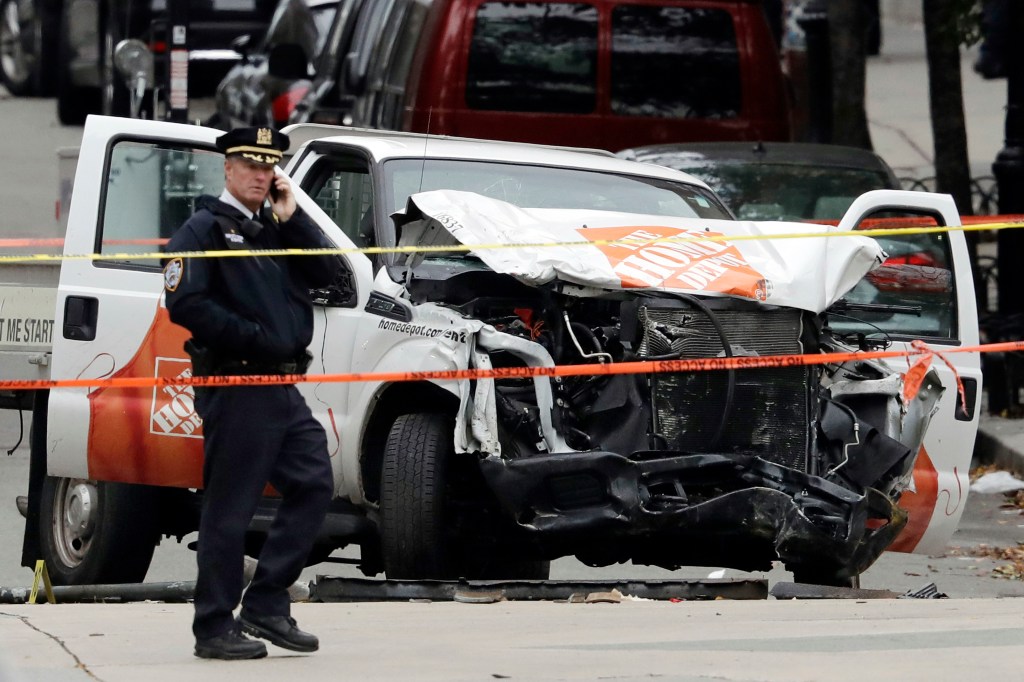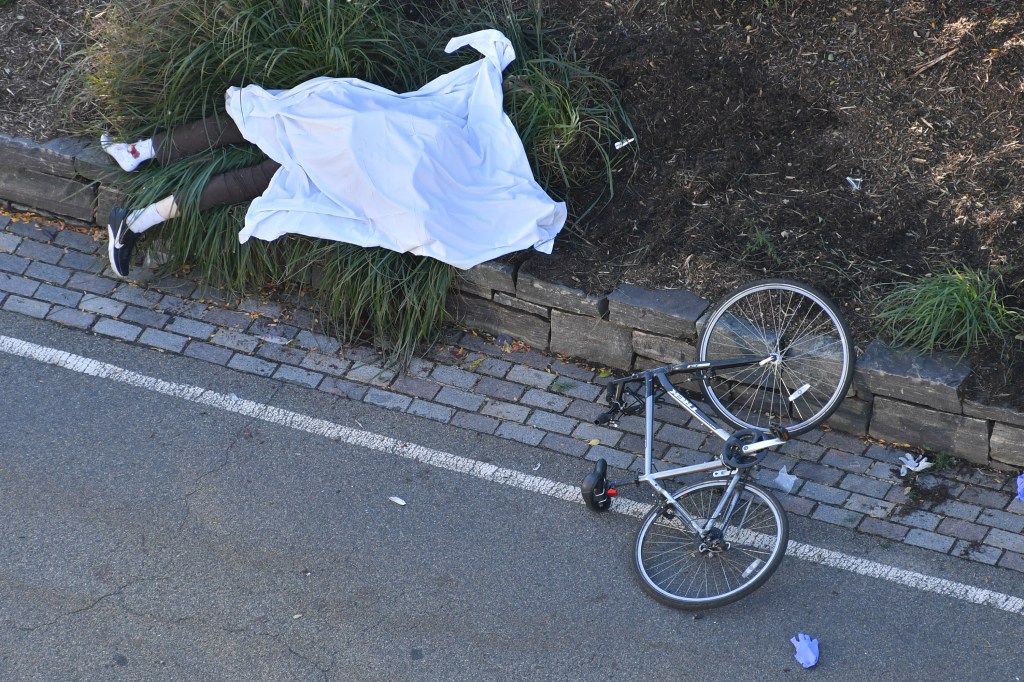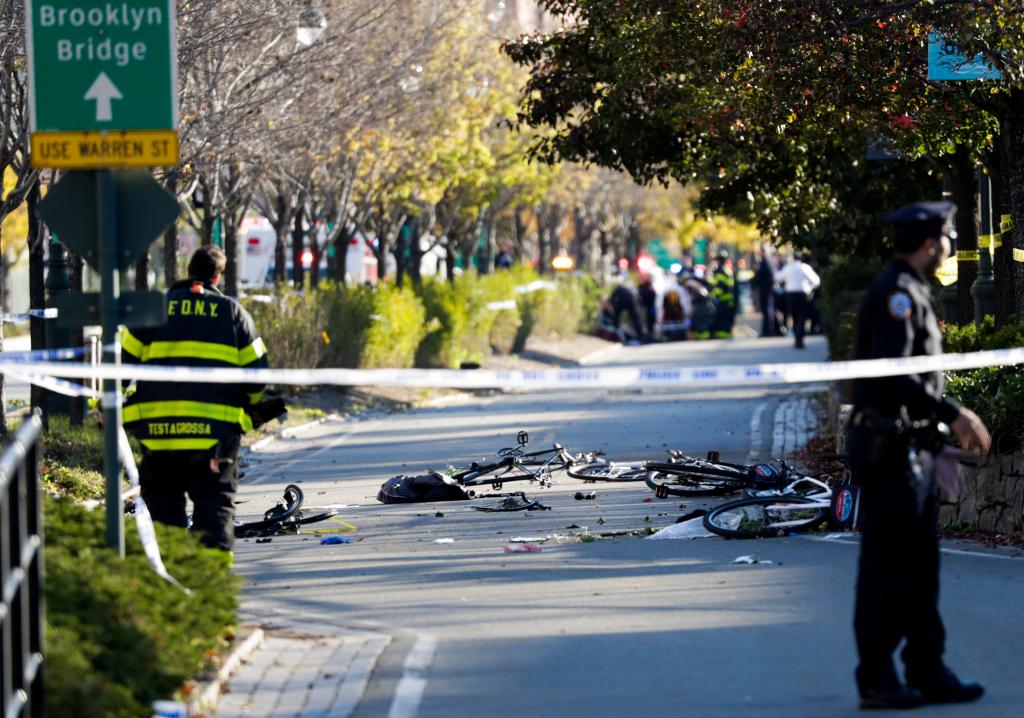No death penalty for NYC terrorist Sayfullo Saipov in West Side Highway attack
West Side Highway terrorist Sayfullo Saipov will serve life in prison after a Manhattan federal court jury could not unanimously agree to sentence him to death for killing eight people and wounding several others in an ISIS-inspired rampage.
The jury’s failure to reach a unanimous verdict — necessary to impose the death penalty — on Monday ended a dramatic, monthslong trial that saw surviving victims tearfully testify about the horror of Saipov’s attack and his family members urge jurors to spare his life.
The panel weighed the penalty for about 10 hours before telling Judge Vernon Broderick they were deadlocked Monday afternoon, the second full day of their deliberations.
As Broderick read the lengthy verdict sheet Monday, Saipov showed no visible emotion while listening to a translation through headphones provided by the court.
A formal sentencing date has not yet been set.
Saipov was convicted in January of fatally mowing down eight people along a West Side Highway bike path on Halloween 2017 in a rented Home Depot truck.
During the penalty phase of the trial, prosecutors questioned a host of witnesses – including surviving victims and family members of those slain – to show jurors the horrific violence carried out by Saipov.
Assistant US Attorney Alexander Li told jurors during the guilt phase of the trial that Saipov smiled, gave a “proud confession” and requested an ISIS flag to hang in a hospital room where he was being treated after the attack.
The prosecutor then described the horror on the Lower Manhattan bike path that left eight people dead on the afternoon of Oct. 31, 2017.
“It was a scene of destruction and horror. Mangled bicycles covered the path. The riders — human beings — lay unconscious or dead. Survivors staggered around, wounded and dazed, searching for family and friends,” Li said in his opening statement.
“Screams filled the air,” he added.
The jury convicted Saipov on 28 counts — nine of which carried the possibility of the death penalty — hours after they began deliberations on Jan. 26.
The conviction triggered the penalty phase of the case – which functioned like another full trial, where prosecutors and defense attorneys questioned witnesses, presented evidence and delivered opening and closing arguments.
During the penalty phase, family members of those killed described in painstaking detail how they’ve been devastated by the loss of their loved ones.
The emotional testimony was referenced in prosecutors’ dramatic closing argument on March 7 as they urged jurors to condemn Saipov.
“The defendant caused unbearable pain to these families. They are still suffering,” Assistant US Attorney Amanda Houle told jurors in her closing.
“Has the government proven aggravating factors that show that the way that this defendant chose to commit murder, by terrorist attack and the unremorseful slaughter of innocent civilians. Does that make his crime worthy of a harsher penalty?” Houle asked jurors.
“The evidence shows overwhelmingly that it does,” she said.
Houle then described the testimony jurors had heard about how families of the slain victims had been upended by the terrorist attack.
Victim Nicholas Cleves’ mother, Monica, told the panel she couldn’t put her grief into words, Houle said.
“Monica said there are no words in the human language that can adequately describe the excruciating pain that ‘seared, that consumed me and has never left me since.’ She said all of the enjoyment and connection with life she used to have has been stripped away,” the prosecutor said.
“Maria Alejandra told you how Amber and Mora have struggled since their father’s murder,” Houle said of another family devastated by the loss of a loved one.
“How they feel his absence constantly, how Amber was hospitalized on Father’s Day after having chest pains in the middle of the night, how the girls couldn’t sleep alone for years, and how they miss kissing him at night, so they kiss his urn of ashes instead,” she said.
Saipov’s defense attorneys had sought to humanize him by questioning his family members on the stand, most all of whom broke down in tears when they told the jury they still loved him — despite what he had done.
The defense’s penalty-phase case reached a dramatic peak when his father, sobbing uncontrollably, told jurors he still loved his son “with all my heart” from the witness stand.
The testimony prompted Saipov’s uncle, who was seated in the gallery of the courtroom, to stand up and begin shouting in Uzbek.
“Dirty ISIS bastards!” the man yelled in Uzbek before slamming his fist on a courtroom door and walking out of the room.
In an impassioned closing argument, Saipov attorney David Patton repeatedly told jurors they face a “unique, individualized, moral decision” in whether or not to sentence the terrorist to death.
“That is an awesome responsibility and power, and we are asking you to decide for life, to decide that the appropriate moral decision here is life,” Patton said.
“It is not necessary to kill Sayfullo Saipov, not for our safety or anyone else’s and not to do justice,” Patton said.
The jury unanimously found the existence of 26 so-called “mitigating factors” that they were instructed to consider when establishing a sentence of life or death.
The factors included evidence presented by the defense at trial, including that he’ll be locked up in the nation’s most-secure prison facility in Colorado for the remainder of his life.
The jury also found that Saipov’s life had meaning to his family members, many of whom traveled from Uzbekistan to testify at the trial.
All 12 panelists agreed with mitigating factor No. 24, that he has three children who still love him.

















